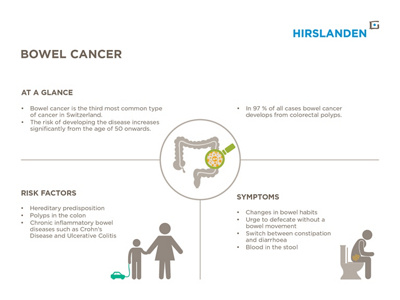The term colorectal carcinoma refers to bowel cancer of the colon and the rectum. Bowel cancer is the third most common type of cancer and primarily affects people aged 50 and over. Altered bowel movements and blood in the stool are the most common symptoms of bowel tumours. It is treated with surgery, chemotherapy and radiotherapy.
- How does bowel cancer develop?
- Risk factors for bowel cancer
- Symptoms of bowel cancer
- Diagnosis
- Treatment of bowel cancer
The small intestine is less frequently affected by the disease, which is why bowel cancer is known in layman’s terms as colon cancer.
How does bowel cancer develop?
The number of men and women diagnosed with this type of cancer is more or less the same. The risk of developing the disease increases significantly from the age of 50 onwards. Colon cancer almost always presents as small polyps, known as colorectal polyps. Preventative examinations are therefore incredibly important for people who face an increased risk. Such check-ups make it possible to identify and remove these polyps at an early stage.
Risk factors for bowel cancer
The following risk factors make a person more likely to develop colon cancer:
- Other family members who have suffered from bowel cancer
- Polyps in the colon
- Chronic inflammatory bowel diseases (Crohn's disease, ulcerative colitis)
- Overweight
- Very little exercise
Symptoms of bowel cancer
Bowel cancer does not cause symptoms or pain for a long time. Important indicators for possible bowel cancer are:
- Changes in bowel habits
- Urge to defecate without a bowel movement
- Switch between constipation and diarrhoea
- Blood in the stool
More general symptoms such as weight loss and tiredness can also point to a bowel tumour. Colon cancer very rarely causes stomach pains. Patients suffering these symptoms should go to a doctor.
How is bowel cancer diagnosed?
A colonoscopy is carried out to diagnose bowel cancer. Tissue samples can be taken from any areas that exhibit suspicious changes, so it is possible to make a definitive cancer diagnosis. Smaller colorectal polyps can be removed during the colonoscopy.
Check-ups involving a colonoscopy or stool examination (blood) are important for the early detection of the disease.
Treatment
The choice of treatment depends on how far the cancer has progressed. If detected early, bowel cancer can be effectively treated by surgically removing the tumour. However, this is only the case if the tumour has not yet grown into the colon and has not yet formed any other tumours (metastases).
In its advanced state, bowel cancer is treated with surgery combined with radiotherapy or chemotherapy. You can find out more about the surgical treatment options in the colon surgery section.
Why choose Hirslanden
The specialists at Hirslanden, the largest private hospital group in Switzerland, are renowned for their expertise and many years of experience in treating your illness.
You can expect comfortable rooms and a modern infrastructure as well as the highest standards in medicine and care.
We will help you throughout your entire stay, organising additional services such as translators and interpreters, transport, and overnight hotel stays for you and your relatives, and addressing all your administrative questions.
A personal contact from the Hirslanden International team will take care of your needs from the time that you first contact us to arrange an appointment through to the end of your treatment.
Contact us – we are happy to help you!

